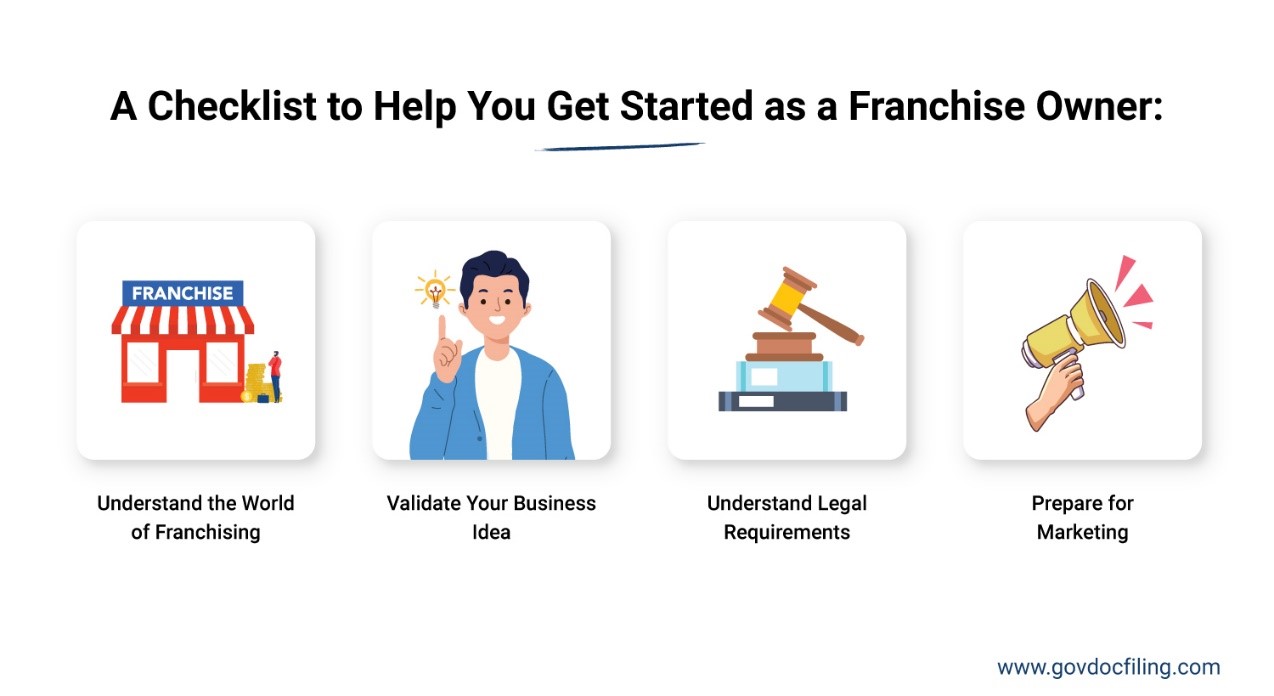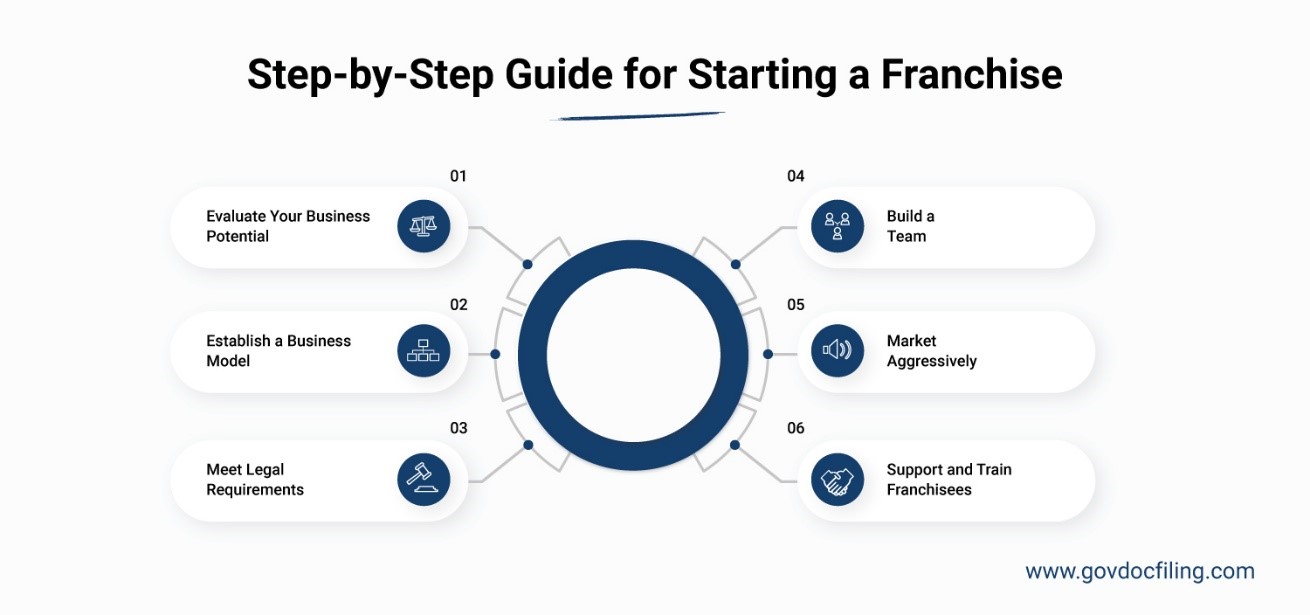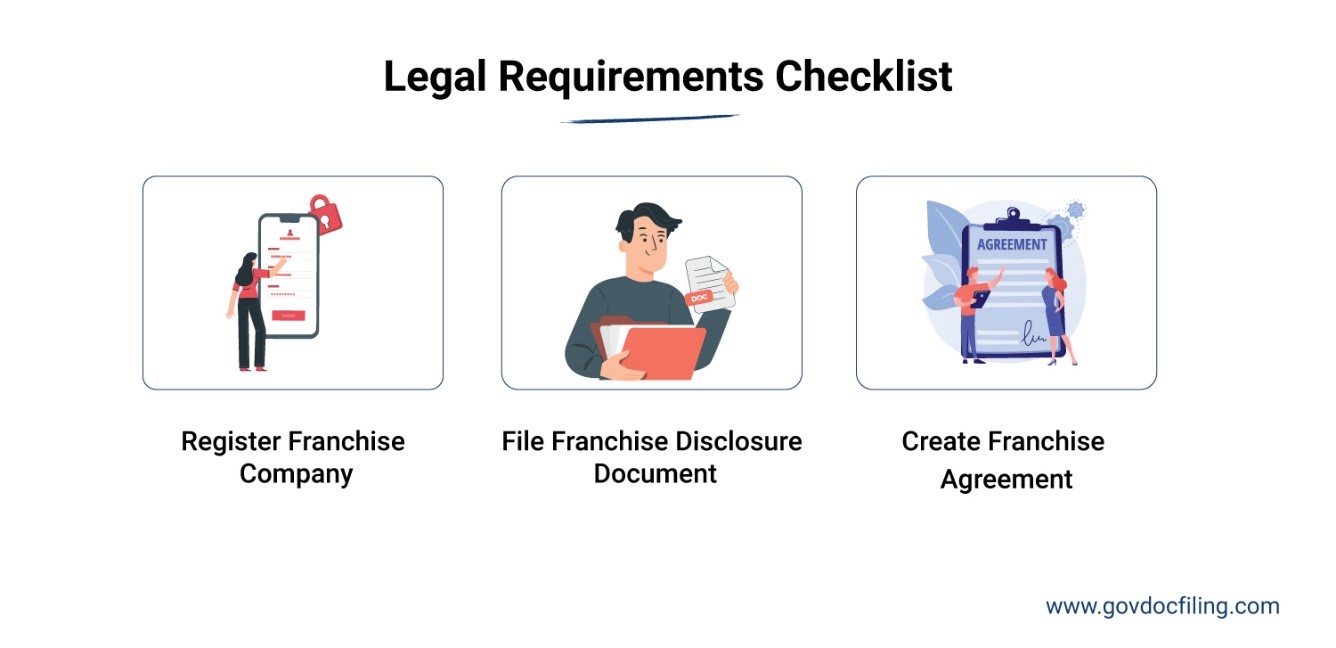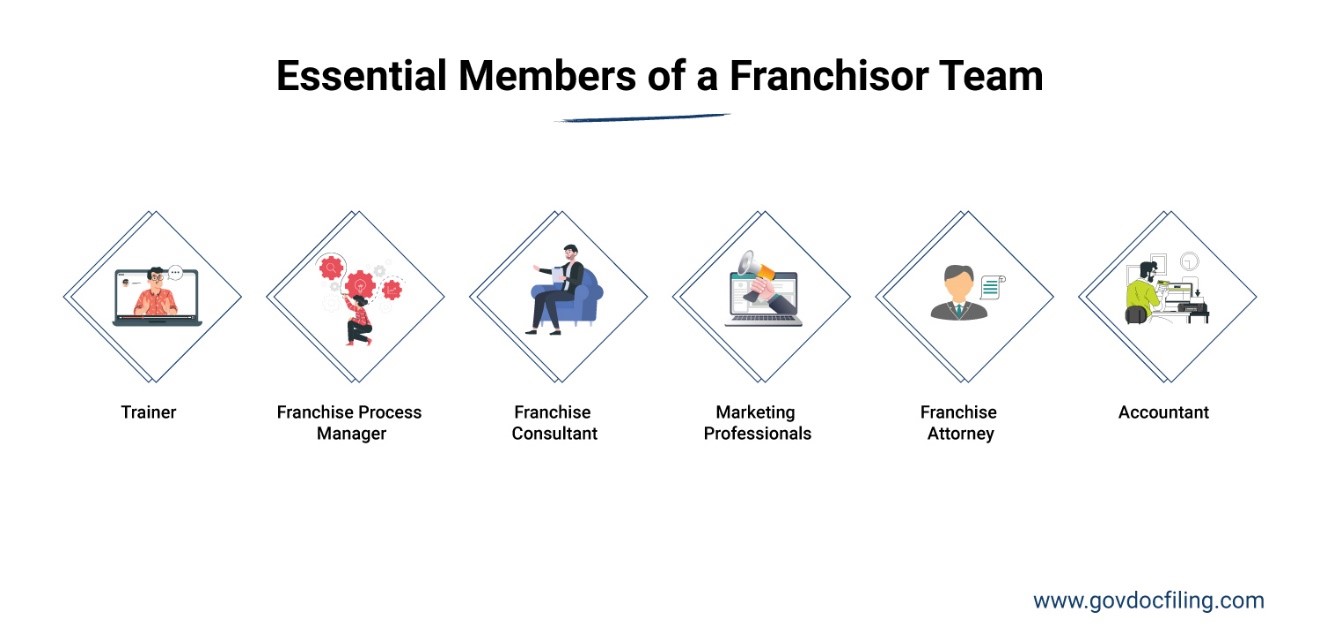Want to learn how to start your new franchise business in 2024?
You’re in the right place.
If you run a successful company, you may want to open stores in multiple locations to expand it.
And the easiest way to do so without greater investment lies in franchising your business.
There are plenty of successful franchise companies today. Think McDonald’s, KFC, Burger King, and The UPS Store.
These franchise companies have a few things in common:
- They’re established under a solid business plan
- They use aggressive marketing strategies
- They have a winning team
- The franchisor is keen to provide ongoing support and training to their franchisees
In this article, we’ll answer all your questions about business franchising, including how it can help you grow your brand, the costs involved, and how you can start your new franchise and be successful.
Read on to find out more.
Things to Consider Before You Start Your New Franchise
Opening your own franchise business can be a lucrative option for those who are running a successful company.
If you have valuable products or services to offer, you can start a new franchise to reach a wider audience.
Franchising allows you to attract and convert new customers and earn higher profits. You can also strengthen your brand’s presence without investing in opening new stores yourself.
Before you start your new franchise, consider the following:
Familiarize Yourself with the World of Franchising
Do your homework to get a deep understanding of the franchising world before you start your new franchise.
Attend franchise shows and seminars that feature owners of successful franchise brands or join organizations like the International Franchise Association (IFA).
These events offer a great opportunity to join a franchise network. You’ll also get professional mentors who can help you overcome challenges in your franchise business through these networking events.
Networking also helps you stay on top of the latest trends, statutory changes, and technological innovations affecting the franchising field.
Validate Your Franchise Business Idea
Evaluate the feasibility of your business idea first before you start your new franchise. This would help you understand if your brand is scalable or not.
Carry out market research that answers these questions:
- Is your product or service popular in other areas of the country?
- Will consumers in other locations appreciate it?
- Is it possible for you to successfully duplicate your business in a second franchise location?
- Are other business owners likely to be interested in the franchise opportunity?
If the answers to the above questions are yes, then you’re on the right track to starting a franchise.
Know the Legal Requirements And Fees Needed to Start a Franchise
Understand what is needed to start your new franchise legally.
As a franchisor, you will need to create a franchise agreement, a franchise disclosure document (FDD), and also pay franchise fees.
The legal formalities are important to ensure that you and your prospective franchisees are on the same page.
Prepare To Market Your Franchise
You’ll need to put in some work to attract franchisees and guide them to efficiently run a business under your franchise.
You can also discuss the idea with an experienced franchise consultant.
They will tell you whether franchising is the right thing for your company. If it is, the franchise consultant can also help you start your new franchise the right way.
A Step-by-Step Guide to Start Your New Franchise Successfully
Franchising is a legal business model that allows business owners like you to expand and achieve multi-unit growth.
By franchising your business, you’ll be able to sell your company franchises to individuals (called “franchisees”) who will open up their own franchised stores under your trade name.
Here is everything you need to start your new franchise:
Step #1: Evaluate If Your Company is Ready to Turn Into a Franchise
As a business owner who wants to make money franchising, you should evaluate if your business is profitable and capable of turning into a franchise.
Franchise consultants advise business owners not to think of franchise opportunities until they have their business up and running profitably in at least three locations.
Having three successful locations means you have the management skills necessary to start and grow a franchise.
You’ll also need to evaluate if you have a reliable source of finances to start your new franchise and run it.
You’ll need financial resources to:
- Cover the initial investment for expansion and other business liabilities before you can make some significant franchise sales
- Take care of all the legal documents needed to start a franchise
- Market to potential franchisees
- Hire people to handle the extra tasks that will emerge when you start your new franchise
- Give your franchisees training and support
- Conduct market research to determine whether or not your end consumers and potential franchisees like your franchise.
At the same time, you should be able to systematize and replicate your business.
Your business shouldn’t need your personal touch to be successful. Otherwise, there is no point in having franchisees run outlets that don’t and can’t offer the same quality service.
For instance, if your talent in landscaping is what makes your lawn care business successful, it may be hard to find a franchisee who has the same skills as you. At the same time, the USP of your business here would be your skills, and not the service itself.
For this reason, it should be possible to standardize your operating system and processes so that all your franchisees can provide a consistent product or service. This way, your customers will have the same experience at each outlet.
This means having a detailed employees’ handbook or operations manual. It should provide a step-by-step guide on how to produce your product and serve customers.
The little details that make your loyal customers recognize your brand’s products can cause your franchise to succeed or fail.
You should also prepare yourself to become a franchisor.
As a franchisor, you will have to focus on selling franchises and supporting franchisees instead of selling your product or service.
Your tasks will involve things like:
- Looking for new regions to expand your franchise
- Developing effective marketing plans
- Meeting with potential franchisees
- Training qualified franchisees and providing them with support
- Investing in supply chain management
Franchising your business means that you will have to give up the 100% control you had over everything involving your company.
However, you will still have control over how you want the franchisees to execute your business.
Step #2: Start Your New Franchise with a Solid Business Model
When turning your company into a franchise, you need to make a lot of important decisions about your franchise model.
You should determine:
- The term of your franchise agreement
- Your franchise fee and royalty percentage
- The states in which you’re willing to sell franchises
- The type and length of training program you’ll organize for franchisees
- The marketing strategy to promote your franchises
The information covered in your franchise model will govern how you’ll start and operate the business as a franchisor. Ensure that you start your new franchise the right way.
Unsure about how to finalize these details?
You can hire a competent franchise consultant to help you make these important decisions for your business.
You will need to include this information in your franchise agreement. We’ll tell you more about the legal document in the next step of starting your franchising business.
But before you start your new franchise, you’ll also need to come up with a screening process for potential franchisees.
The franchisees you choose will represent the brand you’ve fought hard to build, so select carefully.
The wrong franchisee could cause irreversible damage to your brand’s reputation, costly franchisee lawsuits, and damage your business relationship with stakeholders.
So, make sure you do interviews, background checks, and trial assignments to determine the right franchisee. Check:
- The business expertise the franchisee has
- The leadership qualities they possess
- Their financial capability
- Their passion for your business and industry
- If they are capable of maintaining your standards and delivering on your brand’s promise
Step #3: Start Your New Franchise Properly By Meeting the Legal Requirements
If you want to start your new franchise legally in the United States, your business needs to fulfill a few legal requirements.
Make sure that your business is in compliance with the franchise laws, which are a combination of federal and state laws.
Franchise laws govern the registration, sale of franchises, and the legal relationship between franchisors and franchisees.
As a new franchisor, you will have to register a new franchise company such as an LLC named, “ABC Franchising LLC.” You’ll also need to open a bank account for your franchise business.
You need to file a franchise disclosure document (FDD) with the FTC (Federal Trade Commission). It is a lengthy document that discloses:
- Information your potential franchisees may need to know about your company, your sales figures, unique legal requirements, and more.
- Executives managing the franchise system, their business backgrounds, experience, and how long they’ve been with you
- Prior litigation of your business or executives
- Any recent history of bankruptcy
- All costs a franchisee will incur to start and operate the franchise
- Any restrictions regarding suppliers and territory
- Information about your training and advertising programs
- Terms for renewal, termination, and transfer of the franchise
- Methods of dispute resolution
- Growth and turnover of the business, including contact details of current franchisees and those who’ve left in the last fiscal year
- Any franchisee associations associated with your business
- Most recent audited annual financial statements of the business
The FTC files your franchise disclosure document but you need to wait for the state to approve your application.
The authorities might ask you to add more disclosures to the FDD before they approve your application.
Franchise consultants recommend that you update the FDD every year. You can also hire a competent franchise consultant or a lawyer to help you with this.
As a franchisor, you also need to create a franchise agreement to make sure that you and your franchisees are on the same page.
A franchise agreement is meant to protect your franchisor brand and the franchisee.
It’s a legally binding contract that stipulates the rights and obligations of the franchisor and the franchisee.
This document will help you set guidelines for all of your franchisees and help protect the actual essence of your brand.
Ideally, the agreement should give the franchisee the right to use your name, proprietor property system, slogan, logo, service marks, and any other intellectual property as long as they meet your conditions.
Getting the legal services of a franchise lawyer will help you draft the agreement that’ll include other common provisions that’ll guide the contractual relationship, such as:
- How the franchisee is expected to operate the unit.
- The duration of the contract and conditions for renewal.
- Your obligation to provide the franchisee with training and support services for the entire period of the franchise agreement.
- Your obligation to help the franchisee in marketing and advertising.
- Whether the franchisor gets a protected territory to operate the business. This prevents market oversaturation.
- All fees and expenses. This includes the initial and ongoing costs as well as late fees and interest for those who fall behind on payments.
- Your right to approve the franchise location and the obligation of the franchisee to follow your standards when developing the premises.
- Your right to inspect the premises and ensure it’s well-maintained.
- Conditions for early termination of the contract.
- Obligations of both parties upon termination of the franchise agreement. This can include a non-compete clause.
- An arbitration clause. The agreement can also state the jurisdiction for filing a lawsuit.
- Conditions for transfer or resale of the franchise.
- An indemnification clause and the obligation of the franchisee to maintain specified insurance coverage.
- The franchisee’s obligation to maintain accurate financial records and provide regular reports. Also, your right to request financial information and audit the records.
The franchise agreement should be legally binding in writing and signed by both parties.
Step #4: Build a Team to Help You Start Your New Franchise
You should hire a few experienced professionals to work with you as you start your new franchise, such as:
- A trainer to help potential franchisees understand your brand and learn to conduct business under your brand name
- A franchise process manager to help new franchisees use the company software and systems
- A franchise consultant to answer franchisee questions and resolve their problems
- A marketing team to promote your franchise business effectively and attract new franchisees from multiple states. You can also hire a franchise broker to help bring in new franchisees
- A franchise attorney to help with legal requirements as you start your new franchise
- An accountant to determine the pricing of the initial franchise fee to start it, ongoing royalty fees, create effective financial control systems, and help you resolve any financial challenges
Step #5: Market and Sell Franchises Aggressively
As a franchisor, your greatest responsibility is to find reliable franchisees and make them buy your franchise.
To start, you need a robust franchise marketing strategy in place.
Here are some tips to create a strong brand as you start your new franchise.
Strengthen Your Content Marketing Game
As you start your new franchise, you need to embrace content marketing. It’s powerful in attracting, engaging, and retaining strong franchisees.
It’s perhaps due to this reason that 49% of marketers allocate 30-50% of their marketing budget to content marketing.
Creating SEO-friendly content makes your online franchise brand visible to potential franchisees on search engines and helps you generate quality leads.
High-quality content that addresses things like challenges that small businesses face establishes you as an expert capable of managing a successful franchise.
Also, use your website to showcase a strong company culture, technology upgrades, and other tools you have available. It’ll attract potential franchisees.
Use Email Marketing
Email marketing is another powerful digital marketing strategy you should use to attract small business owners and investors to your franchise.
It creates a direct line of communication between your franchise business and small business owners who are potential franchisees.
Personalize emails based on the interests of the prospects to get their attention.
Leverage the Power of Social Media
With over 4.4 billion active social media users worldwide, social media is a powerful marketing tool with a wide reach.
Image via Datareportal
That’s why it’s crucial to develop a solid social media marketing strategy using which you can reach and interact with small business owners and investors.
Many franchisors also opt to buy the services of franchise brokers or hire an in-house marketing team. You should also keep in touch with other franchise owners for franchise opportunities.
These strategies will help you start selling franchises, but it’s not enough.
As a franchise owner, you also need to support your franchisees after they start.
It’ll keep the franchising business up and running profitably, which brings us to the next step.
Step #6 Support Your Franchisees
One way to succeed as you start your new franchise is to build a solid relationship with your franchisees.
Start by developing a solid training program.
The best franchisors invest heavily in training when they start a new franchise. They offer regular training sessions and focus on the development of their franchises across states.
There are several ways through which you can train your new franchisees.
Training in Your Business Premises
This can involve a classroom-setting kind of training where the franchisee learns about:
- Some history of the business
- Matters of site selection
- Lease negotiation
- Daily operations
- Vendor relationships
- Insurance requirements
- System standards
- Reporting requirements
- Business processes
- And everything else they need to know about starting and operating the franchise.
Be sure to create a lively and interactive training session as this is where it’ll all start.
Use a variety of training methods, such as videos, practical work, and discussions to drive home the message.
The franchisees can also visit your corporate offices, meet the staff and learn their roles. They can also visit the established units to learn more about how the units operate and interact with their fellow franchisees to understand the business better.
Evaluate the franchisees after the training to ensure they understand what is required of them.
On-Site Training
As you start your new franchise, don’t just throw the franchisee in the deep end without any assistance or guidance.
The stress of opening a new outlet of your brand could make them forget everything you taught them in the previous training. Additionally, any mistake by them could hurt your brand.
Assist them with setting up the unit or send an opening team to guide them on the day-to-day operations of the franchise in the first days or weeks.
On-site training also ensures that there is an experienced person on-site to guarantee customers a great first impression of the brand.
Be sure to give the franchisee feedback on areas they need to improve.
Ongoing Training
Once you start your new franchise, keep in mind that training doesn’t end after franchisees have set up their unit.
As your business adapts to the changes in industry trends, you need to keep training your franchisees as well.
Besides training, create open communication lines with your franchisees. It’ll make it easier to provide them with the support they need to run their unit.
You should also make it easy for franchisees to share business ideas or feedback with you. Create channels like the ones below to aid in this aspect:
- Intranet portals or a franchise website
- Regular regional meetings
- Feedback forms
- A franchise brochure
- Conventions
- Direct communication channels with key decision-makers
Open communication channels let you know the products or practices that are working and not working with your customers.
You’ll also get suggestions on new products, areas of weaknesses in the operating system or tools the company is using, and more. These insights, in turn, can help you take steps to improve your franchise further.
In a nutshell, you must ensure that your franchisees have the tools they need to succeed. These include access to a reliable supplier network, guidance on hiring, training, and paying staff, and access to advertising materials.
FAQs
1. What are the legal requirements to start your new franchise?
There is a federal law that governs franchise operations in the U.S. To start your new franchise, you are required to:
- Register a new franchise company, which can be a Limited Liability Company or Corporation
- File a franchise disclosure document (FDD) with the FTC (Federal Trade Commission).
- Create a franchise agreement
2. Can you start your new franchise from your own business?
Yes, you can start your new franchise from an existing business.
Franchising is where you sell the franchise rights of your business to independent investors who then open additional outlets under the franchise trademark.
The franchisee is independent, but you’ll retain significant control over the outlet’s operations and receive initial and ongoing fees from the outlet.
3. Why do franchises fail?
You can start your new franchise and fail as a result of:
- Poor screening of franchisees
- Inadequate support and training of the franchisees from the franchisor
- A poor business plan
- Starting the business with a non-existent marketing plan
- Failure of franchisees to follow the defined system
4. How do you franchise a product?
If you have a product and would like to start your new franchise, follow these steps:
- Ensure that your business is capable of turning into a franchise
- Create a strong franchise business model
- Follow the legal requirements for starting a new franchise in your state
- Build the right team
- Develop a growth strategy for your franchise
- Give continuous support and training to your franchisees
5. Am I to be a franchisor or a franchisee?
Once you start your new franchise, you’ll be a franchisor, who is the owner of a brand’s trademark. The franchisor sets the business model and terms for using the brand’s trademarks.
A franchisee is an independent investor who operates a business under your brand’s trademarks.
Are You Ready to Start Your New Franchise?
Whether to start a franchise business or not is a big decision.
Before you start franchising, you should make sure that your company is actually ready for it.
You need to evaluate the demand for your product or service, the feasibility of duplicating your business model, and the availability of prospective franchisees.
Once your company is ready, make sure that you follow this step-by-step process to start your new franchise. It is important for you and your franchisees to adhere to the franchise laws at all times.
You may also hire a franchise consultant to provide advice and help handle the legal requirements of the franchising process.
Do you have other questions about franchising? Do you need help to start your new franchise and have it registered? Feel free to connect with our business formation experts for guidance.




